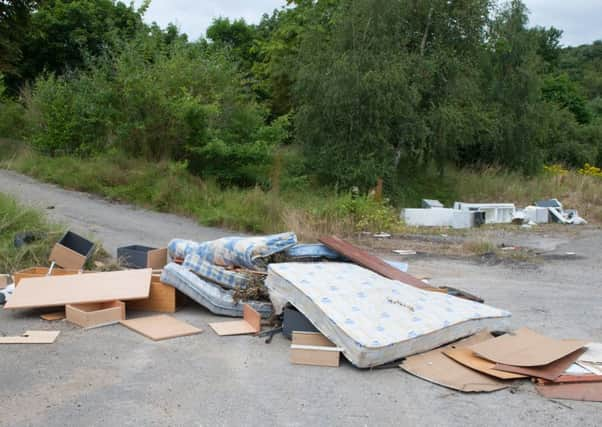Fly-tipping on rise as town halls snub new on-spot fines


Since May 2016, councils have had the power to impose fixed penalty notices (FPNs) to those caught illegally dumping waste under new legislation introduced by the Government.
The Unauthorised Deposit of Waste (Fixed Penalties) Regulations 2016 authorises councils to issue fines ranging from £150 to £400 for small-scale fly-tipping offences, in a bid to curb the escalating problem which is blighting communities.
Advertisement
Hide AdAdvertisement
Hide AdLast month, councils across England reported 936,090 cases of fly-tipping in 2015-16 – up by four per cent on the previous year – and according to Defra it now costs councils £50m a year to clear up rubbish.
But figures obtained by The Yorkshire Post show that an average of 22 FPNs have been handed out in Yorkshire cities to date – bringing in between £200 and £400 each time.
Dorothy Fairburn, director north of the Country Land and Business Association (CLA), called for councils to use all their powers to tackle the issue.
She said: “We recognise that there is a cost to councils for investigating and prosecuting these criminals, but judging by the scale of the problem, fixed penalty notices are not making an iota of difference to fly-tipping incidents.”
Advertisement
Hide AdAdvertisement
Hide AdThe figures show council bosses in Leeds have issued 20 FPNs since the law came in, bringing in a total of £6,000 in fines.
The city was last month named the eighth worst area of the country for fly-tipping, with the number of incidents reported to Leeds City Council surging to more than 16,000 last year – a four-year high.
The FPNs issued are in addition to prosecutions through the courts, which in Leeds are on the rise – with 22 carried out last year, up from 14 the year before.
A Leeds City Council spokesperson said: “Fly-tipping is a real blight on our communities and residents can be assured we will use every tool at our disposal to take action against those people who are illegally dumping their rubbish and waste.
Advertisement
Hide AdAdvertisement
Hide Ad“Like all types of prosecutions, investigations must be properly undertaken and evidence collated, which does mean sometimes there may be a longer wait in issuing some FPNs than others.
“Since November 2016, we have in fact issued 20 FPNs and all of our environmental officers are committed to pursuing this action if required against anyone who is removing their waste or rubbish in a non-appropriate way.”
The latest statistics show that elsewhere in the region, York City Council reported issuing 16 FPNs since the law came in, while Bradford issued 23.
In Hull, a total of 27 have been handed out and in Sheffield the figure was 28, the highest number of all five cities.
Advertisement
Hide AdAdvertisement
Hide AdCoun Bryan Lodge, cabinet member for environment at Sheffield City Council, said: “While the legislation introduced last year has given local authorities more powers to deal with fly-tipping incidents, we must still have sufficient evidence of the offence before a fixed penalty notice can be issued.
“We also take people to court if the fly-tipping is deemed too serious for a fixed penalty fine to be sufficient – where there is a maximum £50,000 fine and a possibility of a jail sentence.”
The news comes after the Government announced its new Litter Strategy this week, which includes proposals for fly-tippers to be forced to pick up litter.
The tough new measures are part of a strategy aimed at reducing the near £800m annual bill to taxpayers of cleaning up after people who dump litter on the streets.
Advertisement
Hide AdAdvertisement
Hide AdHowever, the National Farmers’ Union (NFU) said the strategy was a “missed opportunity” to tackle the scourge of fly-tipping and argued that a “fundamental problem” was that existing powers for enforcement were not being fully utilised.
NFU deputy president Minette Batters said: “We are pressing the Magistrates’ Association to ensure its members are fully aware of the requirements of the environmental offences
definitive guidelines.
“Magistrates need to make full use of their sentencing powers and provide a real deterrent against fly-tipping.”